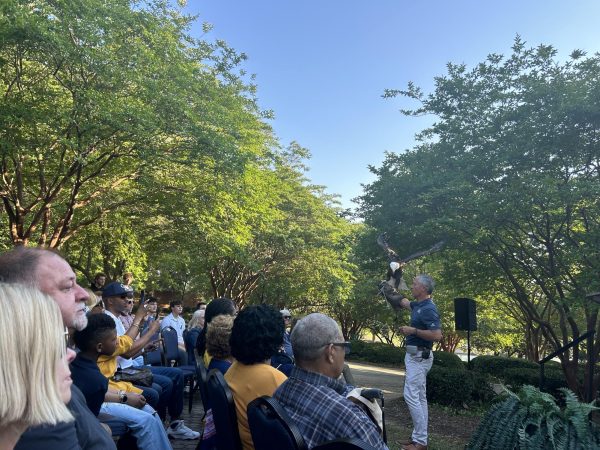Georgia Southern discusses Teacher Evaluations
April 16, 2015
Teacher Evaluations: “Student Ratings of Instruction.” Every class at Georgia Southern has to complete them, but do they really help anyone? The SGA’s Vice President of Academic Affairs Errol Spence, and a paper by Georgia Southern Psychology Professors Janie H. Wilson and Rebecca G. Ryan say yes, but acknowledge that improvements could be made.
Student Ratings of Instruction (SRIs) are currently conducted within two weeks of the last day of class, in class. Instructors do not receive summaries of the SRIs until after the termination of class, often not until the early weeks of the next semester.
Next semester, however, is too late to help the students currently enrolled in a class. Teachers often have to be proactive to assist students in the short term.
“Although I look at my student ratings of instruction, I don’t wait for them to make classroom changes,” Loretta Brandon, English instructor, said. “When I see a student struggling, I ask them how I can help.”
The Faculty Senate has created the SRI Revision Committee to address this and other shortcomings with the current SRI system.
“The charge of this committee is to ensure that the SRI instrument is consistent with BOR policy,” Errol Spence, SGA’s Vice President of Academic Affairs and student voice on the committee, said.
The committee has discussed alternatives including improved forms with additional emphasis on qualitative reflection (rather than filling in columns), varying the SRI based on the type of course and administering additional SRIs mid-semester.
“[With Mid-semester SRIs] students may have the opportunity to evaluate any improvements to their learning experience and professors could assess if their adjustments (if any) were effective,” Spence said.
This solution is endorsed by Georgia Southern Psychology Professors Janie H. Wilson and Rebecca G. Ryan in their paper “Formative Teaching Evaluations: Is Student Input Useful?” The paper strongly supports both SRIs as a whole and explains at length their ideal environment.
“Student evaluations of teaching offer valuable information to teachers who want to improve their teaching,” Wilson and Ryan write. “Specifically, formative student evaluations collected prior to the end of a course allow teachers to adjust teaching practices and potentially enhance learning… In the end, students want to be heard; they want to know the teacher is listening.”
GSU’s SRIs are also used as part of the annual evaluation of faculty, according to Associate Provost Diana Cone. This evaluation, among other things, helps to determine the allocation of merit-based pay increases, a compelling factor for many professors.
This compulsion doesn’t hold true for instructors, however, who are often not eligible for merit pay increases. Brandon says that in this light, the evaluations aren’t a big deal with instructors, as they don’t weigh on pay or contract renewal for this class of teacher.
“SRI’s are a students’ opportunity to honestly convey to faculty and administration how they were impacted by the learning experiences they had in a course,” Spence said. “Combined with the opinions of hundreds, maybe thousands of other students, SRI’s enhance student learning.”














